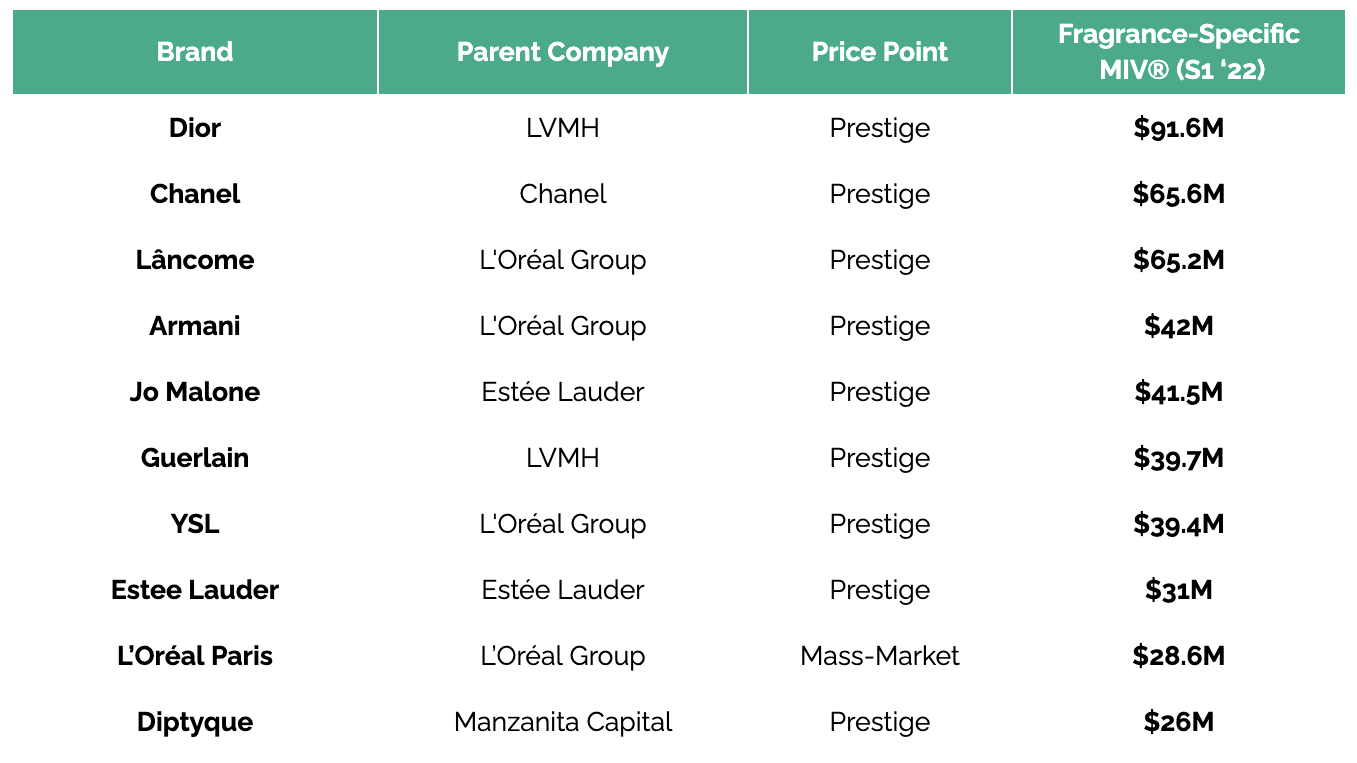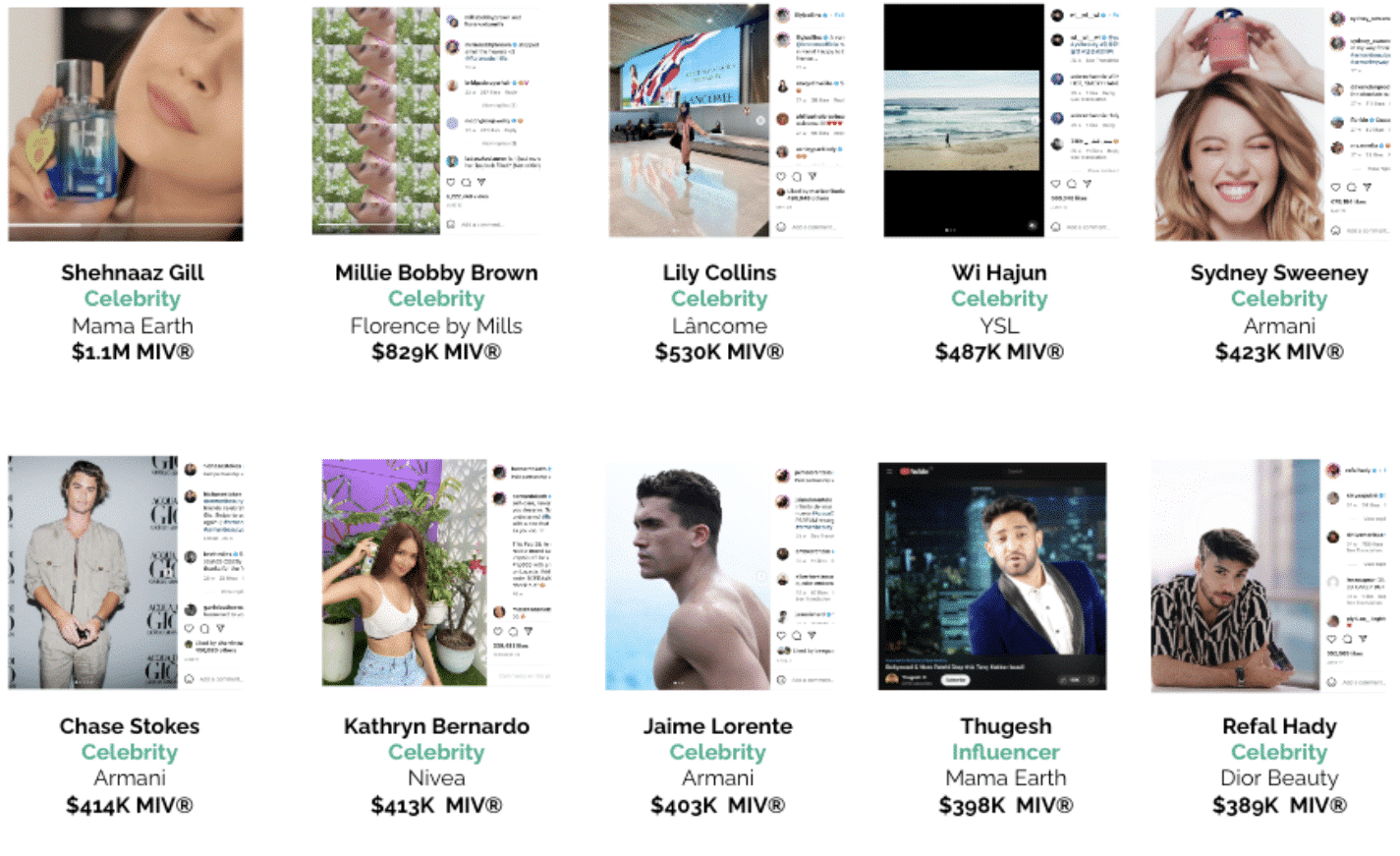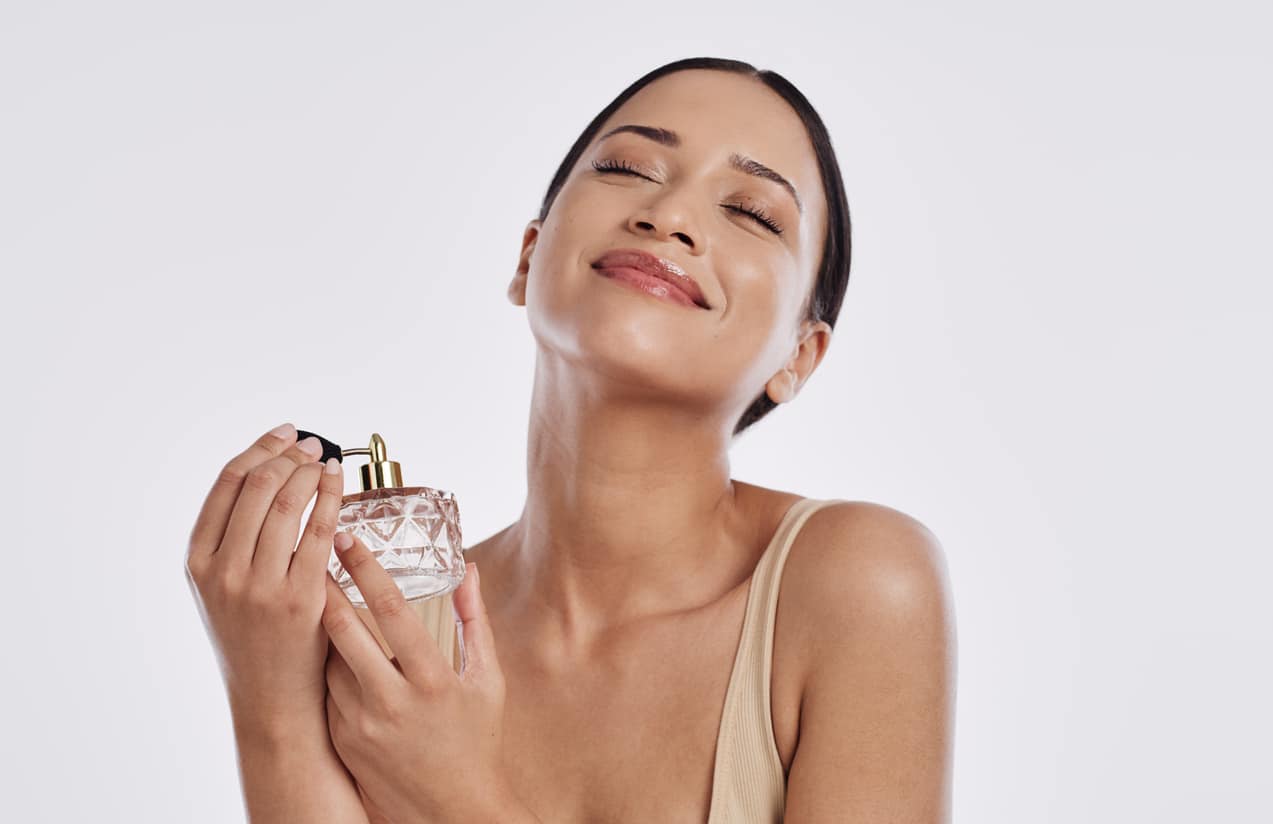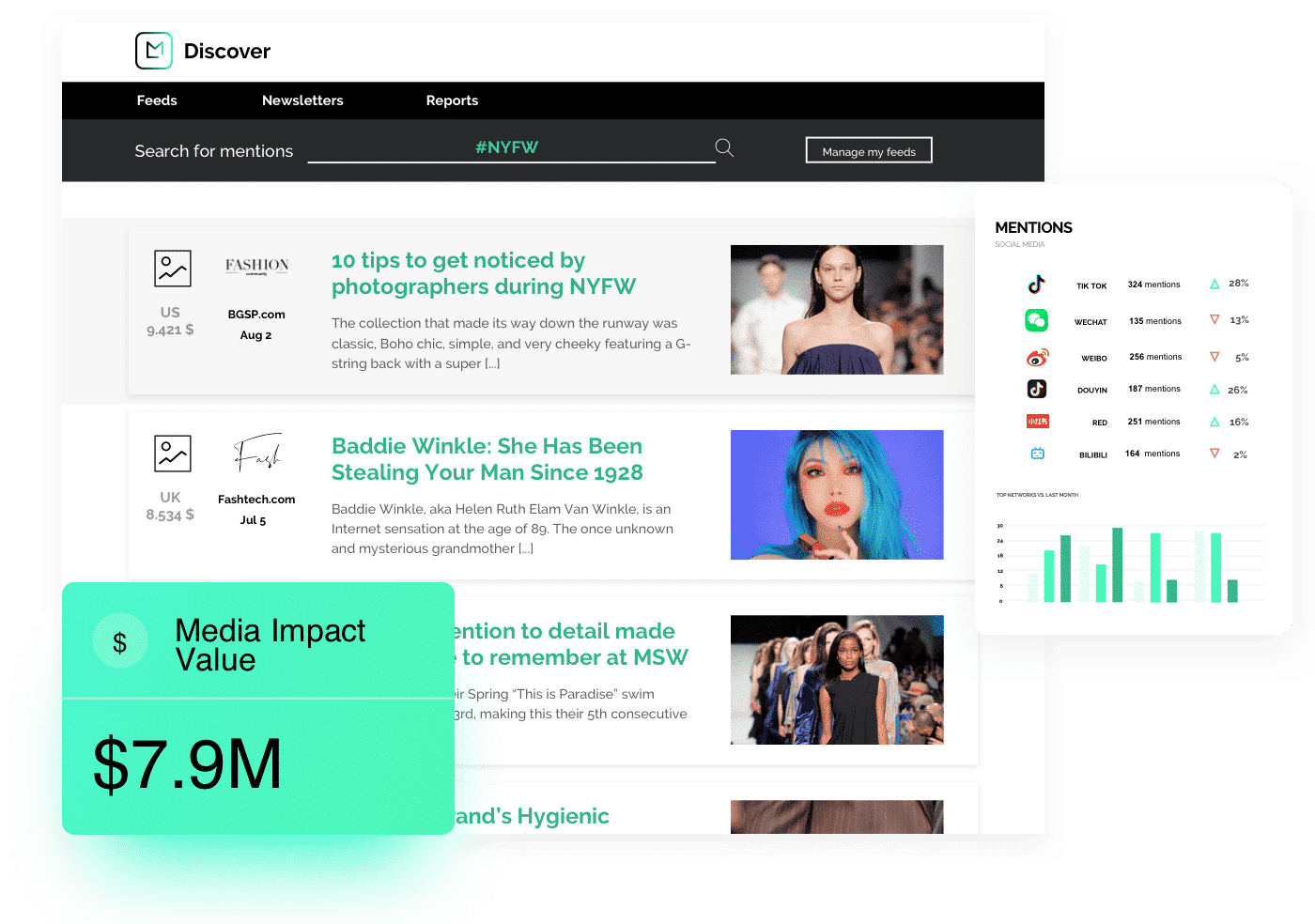We’ve already determined the cream of the crop for skincare and brushed up on the most impactful makeup players. Today, we’re making our way through the delightful mist of fragrance brands that topped our Media Impact Value™ (MIV®) ranking in S1.
From timeless classics like Chanel No.5 to more recent efforts like YSL’s Black Opium – the perfume market is not to be sniffed at.
Indeed, fragrance brand marketing has evolved exponentially over the years – from simply selling a scent to promoting perfume that encapsulates a buyer’s lifestyle or even aspirations. It’s no surprise that the luxury fragrance market is set to grow by $4.20 billion before 2025.
Read on to see the brands (and competition) topping the charts and the posts that are heaven ‘scent’.
In this article you’ll learn…
Top 10 fragrance brands by MIV®

During the pandemic, the industry saw a huge dip in perfume sales. In the immediate aftermath, brands had to work overtime to rebuild ROI. Luckily, momentum returned and with gusto.
Fast-forward to S1, 2022 and prestige fragrance brands have dominated the MIV® leader board. However, L’Oréal Paris cementing itself at number nine proves marketers shouldn’t turn their nose up to mass-market media.
And it’s difficult for many to light a candle to Jo Malone, an innovative brand well-known for experimenting with unexpected ingredient combinations.
The team is just as creative in their media strategy. In fact, in S1, the brand garnered $41.5M in MIV® across placements related specifically to fragrance. The impressive figure accounts for 69% of their total MIV® during the season.
Jo Malone’s top placement comes through strategic use of Voice in the form of celebrity, Urassaya Sperbund. A single Instagram post from Urassaya, promoting the brand’s Blossoms collection, achieved $360K in MIV®.
Speaking of successful Voice placements and posts…
Top 10 fragrance posts by MIV®

We encountered some usual suspects in our top posts ranking, but also saw some fresh fragrance faces.
Once again, strategic use of Voice placements has meant that nine out of ten posts hail from celebrity-owned accounts.
In our skincare list, top ranking posts featured celebrities endorsing their own brands. In fragrance, we see the opposite, with celebrities endorsing brands through partnerships. This seems to be the most impactful relationship for perfume co’s and successful media mentions.
Our highest ranking MIV® placement is Shehnaaz Gill’s collaboration with Mama Earth. This particular fragrance brand, a cruelty-and-toxin-free company, achieved $1.1M from just one post. The brand also appeared twice in our top ten ranking, meaning it’s one to watch.
MIV® offers a great metric for measuring competition. As newer fragrance brands gain industry traction with their media mentions, it’s important to keep up to date with which ones are moving up the ranks and why. This will help with assessing your own marketing strategy.
Speaking of strategy, let’s look a little closer at the commonalities and trends in fragrance brand performance.

Fragrance brand performance and trends
A fresh take on campaigns
In S1, top campaigns appear to have a lifestyle-focused angle, evoking feelings of cleanliness and freshness. According to a case study by Glossy, the ‘clean beauty’ industry will make $11.6bn by 2027.
Millie Bobby Brown achieved our second-highest MIV® ranking post promoting her own brand, Florence by Mills. The Stranger Things actress didn’t even need to feature the product in her post. The floral backdrop, her minimal makeup look and a subtle nod to scent in her caption did the job.
Equally, Sydney Sweeny’s post for Armani perfume features the Euphoria actress fresh-faced, in natural makeup and with a mention to floral tones in caption. Each time, the celebrities are subtly creating a connection between the audience and a fresh, clean, stripped-back scent.
Changing consumer needs
It’s been well documented that Gen Z consumers, who now make up over one third of the population, are more value-driven in their purchasing decisions.
Reports have shown that Gen Z customers are more likely to buy eco-friendly products. 73% of them will even pay 10% extra for sustainable items.
Florence by Mills and India-based firm, Mama Earth, both openly advertise their brand’s cruelty-free and sustainable ethos. This could be another reason why they’ve become such a hit with the modern day consumer.
Just by having access to your competitors’ MIV® data, you can piece together the trends seen across the high and low performers.
These golden nugget insights can inform your own performance, keeping you ahead of the competition. You can then focus on shaping the feeling you’d like to evoke from your own audience, promoting campaigns with data-backed confidence.
Finally, it’s time to take a deeper look into some of these perfume performers to understand their successful Voice strategies in more detail.
Dior vs Chanel
Share of Channel by MIV®

Channeling the right perfume
During S1, our top performers were Dior ($91.6M in MIV®) and Chanel ($65.6M in MIV®). Despite both reaching the top two positions, there’s no denying the significant gap in their total achieved MIV®.
In what some marketers might consider a surprising twist – especially in this technology-focused age – print media plays a big role in Chanel’s media strategy.
Subsequently, 21% of the beauty brand’s MIV® comes from print mentions. That’s almost as much as their Instagram account, which only has a 1.1% higher MIV® recording.
Dior and Chanel each see their own Instagram accounts (‘Owned Media’) feature highly. The total MIV® of Dior’s accounts comes to $15M, Chanel’s total number is 35% lower at $5.5M.
Both brands are taking advantage of the opportunities in the Chinese market, with their China marketing strategies seeing content shared on Douyin, the country’s TikTok equivalent.
Dior, for example, has an average of $38K MIV® per placement Douyin, despite the fragrance brand only having 216 placements on the platform.
Share of Voice by MIV®

Dior utilised Influencers as their key Voice for S1, while Chanel relied more heavily upon the Media to achieve a larger MIV® share.
While Influencers collectively make up a large share of MIV® for both brands, the most valuable Voices in terms of MIV®/placement ratio are actually celebrities. This is because an Influencer’s placement is usually worth less monetary impact than a celebrity’s mention.
It’s also worth mentioning that the average MIV® score for Dior is significantly higher (126%) than Chanel’s.
In conclusion, while both brands utilize a mix of Voices and Channels, Dior’s strategy relies on the wide reach and younger audiences accessible through social media. Meanwhile, Chanel maintains its timeless status by keeping print media close to the forefront of its campaigning.
Fragrance brands: be the center of attention
Each media mention plays a key part in brand performance. Knowing where you stand against your competition, and the results that different Channels or Voices can bring, can make or break a campaign (and your marketing budget).
For years we’ve worked with the biggest brands in the FLB space, providing data they can rely upon. If you’d like access to thousands of publications, true engagement metrics and have the availability to measure your success on a global scale, then contact our team today.


